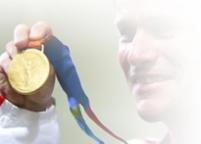|
|
|
CSC2012
Examination Results
Examination: Best marks
|
|
Examination: facts and figures
|
2012 |
|
Questions |
34
multiple choice questions were proposed.
After deliberation, the
jury decided that all 34 questions should be validated. However, as
there was a possible ambiguity on question 30, two possible
responses have ben considered as valid for this particular question
(those having chosen one of these two responses obtained the point
attached to this question).
|
|
Pass / No-Pass
threshold |
To be declared
as having successfully passed the examination, the student must have
replied correctly to
50%
or more than 50%
of the
questions. |
|
Number of
correct answers for successful pass |
Any student having replied correctly to
17
or more than 17
questions has been declared as having successfully passed the
CSC examination |
|
Number of successful students |
55 students succeeded in the examination
(updated 24th of August 2012). |
|
Rewards |
-
CSC Diploma will be handed over to the students at the occasion of
the closing ceremony.
-
The students with the
highest marks will be announced
at the closing session Friday 26th of August.
-
ECTS Certificates will be given together with the CSC
diploma.
|
|
Marks |
Individual marks will be available on demand by email,
after the closing
session only, from Ivica Puljak (Ivica
(dot) Puljak
AT cern (dot) ch).
|
|
|
|
|
Examination: List of successful students
|
The CSC Jury is pleased to warmly congratulate the following
students who will receive the CSC Diploma as having have successfully passed the 2013 examination
and fully followed the entire programme. |
|
The students
below will received the CSC Diploma as having successfully passed the
examination and fully followed the entire programme.
We congratulate them! François Fluckiger, CSC Director |
| Adde, Geoffray |
| Ahn, Sul-Ah |
| Ahrens, Raphael |
| Alvarez Alonso, Roberto |
| Alvarez Granda, Elias |
| Alvarez Perez, Carmen |
| Bandieramonte, Marilena |
| Bianchi, Giovanni |
| Botezatu, Mirela |
| Botrel, Gautam |
| Bustamante, Mariana |
| Carli, Samuele |
| Castro Leon, Jose |
| Cervigni, Luca |
| Cinquilli, Mattia |
| Compostella, Gabriele |
| Devresse , Adrien |
| Dieguez, Daniel |
| Dumitru, Andrei |
| Elsasser, Christian |
| Espinal, Xavier |
| Fajardo, Edgar |
| Fernandez, Sergio |
| Floderus, Anders |
| Galster, Gorm |
| Garca Llopis, Jaime |
| Garcia Molero, Alberto |
| Gredig, Roman |
| Hellmich, Martin |
| Karapetyan, Gagik |
| Karasek, Tomas |
| Kasioumis, Nikolaos |
| Kiesenhofer, Wolfgang |
| Kolad, Blazej |
| Koloventzos, Georgios |
| Kunčar, Jiř |
| Lavik, Jan ge |
| Lazzaro, Claudia |
| Makatun, Dzmitry |
| Mazzaferro, Luca |
| Medrano Llamas, Ramon |
| Pantaleo, Felice |
| Pera Mira, Omar |
| Prieto Barreiro, Ivan |
| Ritter, Martin |
| Rodrigues, Luis |
| Sailer, Andre |
| Sputowska, Iwona |
| Topaloudis, Athanasios |
| Tresch, Marco |
| Uria Eismar, Christian |
| Weuste, Lars |
| Wolin, Scott |
| Zilaskos, Dimitrios |
55 students have passed the
examination
2012 Podium: Pictures and Bio
1st Mark
2012 |
|
Martin RITTER |
Max-Planck-Institut
für Physik, München - Germany |
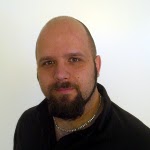 |
|
I am from Germany and studied physics at the LMU Munich.
Currently, I am a PhD student at the Max-Planck-Institute for
Physics, working primary on the pixel detector for the upcoming Belle II
experiment. My main focus has been to work on the Belle II experiment on
detector simulation and optimization, involving the development of the
software framework and simulation of the pixel detector.
I am also involved in the mechanical design and cooling of this
detector. In addition I'm doing a physics analysis for Belle about the
time dependent CP-Violation of B mesons in the channel B0 -> D*+ D*- Ks
with the full data set of the Belle experiment. My main development is
done on Linux in C++ and python but I have also experience with many
other languages (e.g. Java, PHP) and and SQL database systems (e.g.
Postgres and MySQL) |
|
2nd Mark
2012 |
|
Samuele CARLI |
CERN, Geneva -
Switzerland |
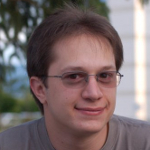 |
|
I
currently work on the author disambiguation facility for INSPIRE, the
CERN's digital library.My work is focused on approximating the
solution of a hard, constantly evolving problem using high level
techniques, parallel and distributed computing as well as crowd-sourcing
based algorithm supervision; this involves research on cutting edge
multi-staged data clustering algorithms, exploration of possibilities
for optimization and parallelization of such algorithms and research in
techniques to allow fast re- computation upon small input data changes.
I am familiar with high level languages as Python (main language used in
INSPIRE), matlab-like and java as well as C, C++. I am usually working
with UNIX like operating systems.
I am as well a M.Sc. student in computer science at Università degli
Studi di Firenze specializing in numerical analysis and parallel
computing; I have broad and strong interests across many fields,
especially physics, mathematics and electronics. |
|
3rd Mark
2012 |
|
Martin HELLMICH |
CERN, Geneva - Switzerland |
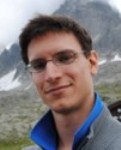 |
|
I am currently a fellow in the Grid Data Management section at CERN. I
am involved in EUDAT, a project to design and build a common data
infrastructure for researchers in Europe.
I studied Computer Science in Magdeburg, Germany and Distributed
Scientific Computing in Edinburgh. The latter brought him in contact
with the WLCG and CERN, so I decided for a openlab internship. My
interests lie in large-scale data management and processing, as well as
machine learning and all its applications. If I do not work, I am either
biking or skiing, depending on the weather. |
|
|
20 12
Special distinctions: Pictures and Bio
|
In addition
to the podium, the jury of
the CSC examination is pleased to award a special distinction
to the five students below who obtained a mark of 30 and
ranked 4th.
|
4th Mark |
|
Christian ELSASSER |
University of Zürich -
Switzerland |
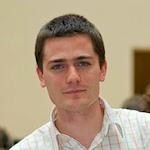 |
|
I received my master degree in physics in 2011 from the University of
Zurich, working in the field of very rare B decays at the LHCb
experiment. Before I was setting up a test facility to monitor silicon
sensors using IR lasers. Subsequently to the master degree I started my
PhD thesis where I've continued the work on very rare B decays, mainly
in the context of particle identification. Further I am also developing
a tool to monitor the radiation damage in the silicon trackers of LHCb
and have just started to study hadronic tau reconstruction in LHCb which
will be used in many Electroweak as well as Flavour Physics analyses. |
|
|
Sergio FERNANDEZ CASADO |
CERN, Geneva - Switzerland |
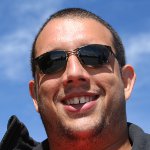 |
|
Currently I am working at CERN, in IT-OIS group. I work on the CERN
Search Project, an enterprise search solution where I have to support
all the operational aspects needed. Im also doing several developing
tasks, like the creation/update of document extraction and processing
pipelines of the engine, automation on common tasks, or developing new
front-end webpages. Previously, I worked as a PHP web developer, as a
teacher, and as a RFID applications developer (including RFID devices
integration). I have experience
working with Windows and Linux, and I am comfortable developing in C#,
Java (ME and SE), C++, PHP, and nowadays, also with Python. |
|
|
Wolfgang KIESENHOFER |
Austrian Academy of
Sciences, Vienna - Austria |
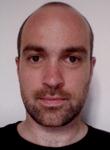 |
|
I studied physics at the Vienna University of Technology and did my
diploma thesis at the Institute of High Energy Physics were I analyzed
test beam data from semiconductor test structures measured at SPS. I am
now a PhD student, starting my 3rd year and I'm currently working for
the CMS experiment. My primary interest is the search for super
symmetry, but I also participated in the muon and the missing energy
object groups. I am currently
working on a background estimation technique for SUSY decay channels
with a single lepton in the final state. Operating systems I use in my
daily work are Linux and OSX, sometimes Windows.
Programming languages I am familiar with are C++, Python and
Matlab. I have also extensively used ROOT and RooFit during the last 4
years. |
|
|
Ramón MEDRANO LLAMAS |
CERN, Geneva -
Switzerland |
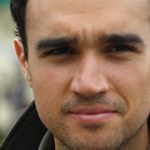 |
|
I
work at the IT-ES group, in which I am the main developer and
coordinator of HammerCloud, the functional testing tool for grid sites
of ATLAS, CMS and LHCb. This tool submits more than 115,000 grid jobs
world-wide daily and has improved the ATLAS analysis reliability by 50%.
Also, I'm involved in the HelixNebula project, to develop a cloud
computing infrastructure for science. Finally, I'm becoming and ATLAS
Computing Manager on Duty. I
finished past year my Research MSc, after obtaining a MSc in Computing
in Spain and currently I am also working in my PhD. Before CERN, I have
worked at Google. I use, administer and maintain a cluster of 17
machines for HammerCloud, work with shell scripting, Python, SQL, high
replication and high performance clusters. |
|
|
Omar PERA MIRA |
CERN, Geneva -
Switzerland |
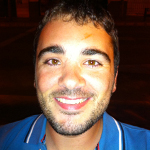 |
|
I am a software engineer working
in the Computing Facilities group at CERN. Currently working in the
Lemon Team, where we develop and support the monitoring framework for
the CERN Computer Center. I am involved also in the new Agile
Infrastructure project, focused on the development of new monitoring
components that fits into the new infrastructure. Before coming to CERN,
I did an internship in the European Bioinformatics Institute in
Cambridge and the University of Bremen, with protein visualization and
semantic web as domain fields, respectively. In the last 2 years, I've
been launching Android applications in my free time. Originally from
Spain, looking forward to the CSC!
|
|
|
|
|
|

